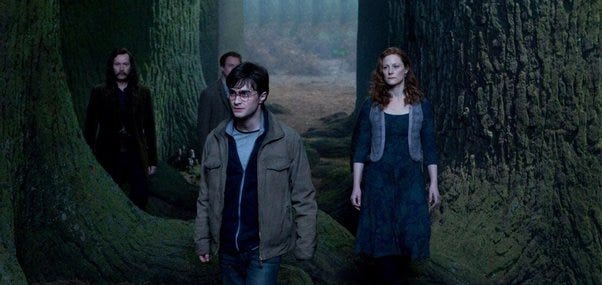Stay Close To Me
I finally tried voiceovers for Substack! If you are reading by email, you can access the audio by clicking the voiceover link and listening from a web browser. Or you can listen easily from the app:

Get more from Aaron Hann in the Substack app
Available for iOS and Android
My family has a tradition of watching the Harry Potter movies during Advent. At least we’re calling it a tradition now that we’ve watched them the past two Decembers. The Potter books proved to be healing for our entire family after being cast out from our church family in the spring of 2022. That summer and fall our children read the series for the first time, and my wife and I discovered anew the relevance for our stories. There are many themes I could write about: trauma, betrayal, friendship, disorientation, grief, sacrificial love, holy fools doubted and discredited, the allure of power, leaders keeping their heads in the sand, evil overcome through the weak and foolish.
But there is a favorite scene that brings tears every time I watch it. It takes place in chapter 34 of Harry Potter and the Deathly Hallows when Harry goes to die in the Forbidden Forest. He intuitively discovers Dumbledore’s purpose for giving him the Resurrection Stone: not to cheat death, but to be encouraged unto death by those few adults who loved him unconditionally: Lily (his mother), James (his father), Sirius (his godfather), and Remus (his professor).
I can’t improve upon Rowling’s storytelling or the visual portrayal of the movie. I write in witness to the powerful representation of how we humans can internalize other persons, what psychologists refer to variously as object-relations and introjection. But before I succumb to the temptation to explain, here is J.K. Rowling showing this reality:
A chilly breeze that seemed to emanate from the heart of the forest lifted the hair at Harry’s brow. He knew that they would not tell him to go [to his death], that it would have to be his decision.
“You’ll stay with me?”
“Until the very end,” said James.
“They won’t be able to see you?” asked Harry.
“We are part of you,” said Sirius. “Invisible to anyone else.”
Harry looked at his mother.
“Stay close to me,” he said quietly. 1
While the Resurrection Stone provided Harry with magical access to these attachment figures, Sirius’ statement is significantly in the present tense: “We are part of you.” Even though absent in death, they were nevertheless always with Harry through the power of love.
These imaginative representations inspire me to imagine anew the repeated teaching of Scripture that Christ lives inside of us. Consider these words from Jesus in light of Harry’s dialogue with his loving caregivers:
“I will not leave you as orphans; I will come to you. Yet a little while and the world will see me no more, but you will see me. Because I live, you also will live. In that day you will know that I am in my Father, and you in me, and I in you.” (John 14:18-20)
It is this Jesus to whom we are united, connected, ingrafted as closely and intimately as a branch of grapes to the vine. It is this Jesus to whom, in the midst of every danger, toil and snare we can plead with complete confidence, “Stay close to me.”
Quote from Harry Potter and the Prisoner of Azkaban
[Dumbledore]: “You think the dead we loved ever truly leave us? You think that we don’t recall them more clearly than ever in times of great trouble? Your father is alive in you, Harry, and shows himself most plainly when you have need of him. How else could you produce that particular Patronus? Prongs rode again last night….You know, Harry, in a way, you did see your father last night…You found him inside yourself.”2
Question
Would you read John 14:18-20 to yourself in the mirror, or ask a dear safe friend to read Jesus words to you, or would you record yourself reading those words and send it someone in need?
1 J. K. Rowling, Harry Potter and the Deathly Hallows (Arthur A. Levine Books, 2007), p. 700.
2 Rowling, Harry Potter and the Prisoner of Azkaban (Arthur A. Levine Books, 1999), pp. 427-428, courtesy of Ashley Whitehead Thomas, https://nerdyblogging.wordpress.com/2010/07/01/god-c-s-lewis-and-j-k-rowling-christ-figures-chapter-ii-part-i/.
